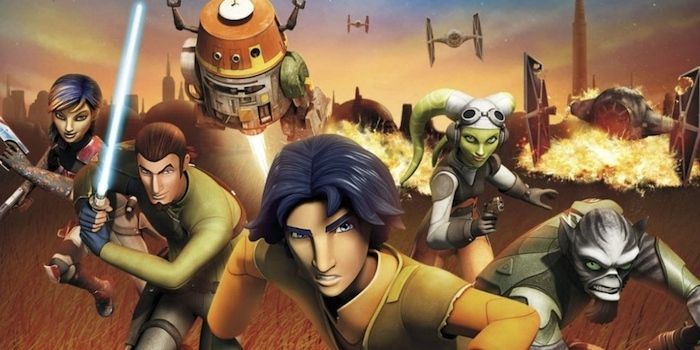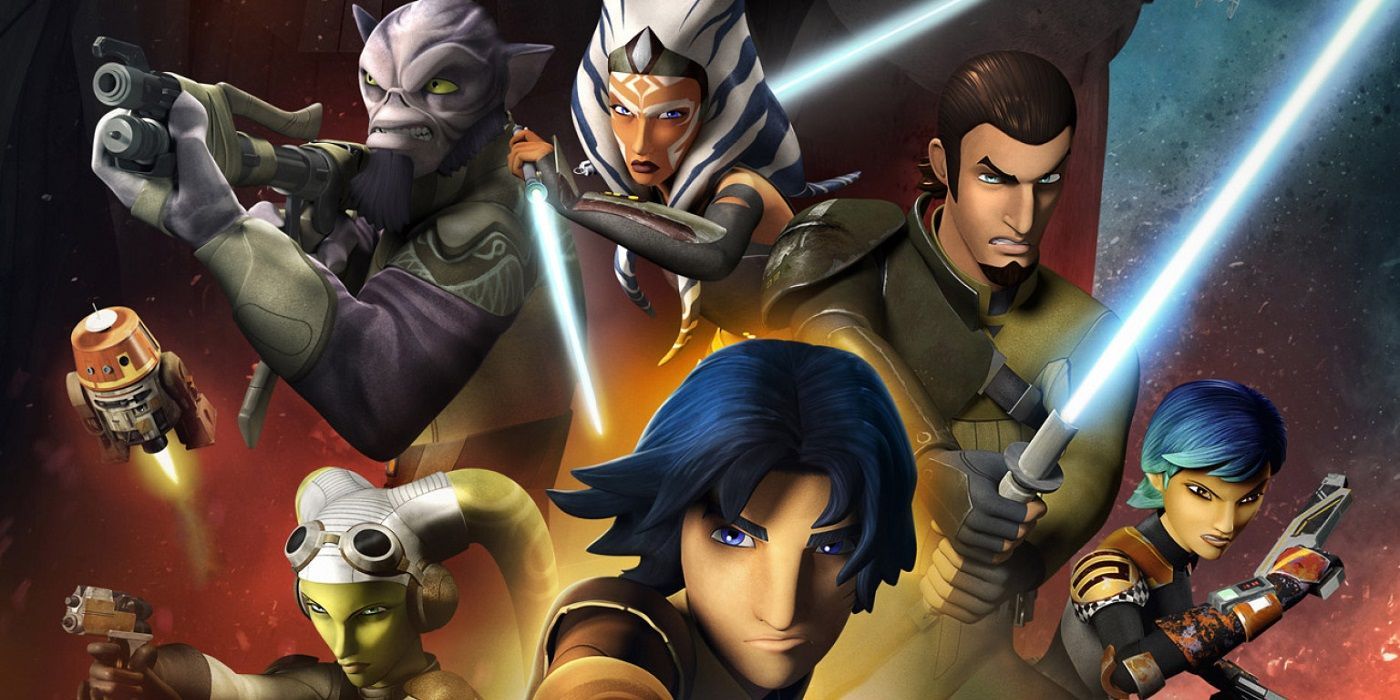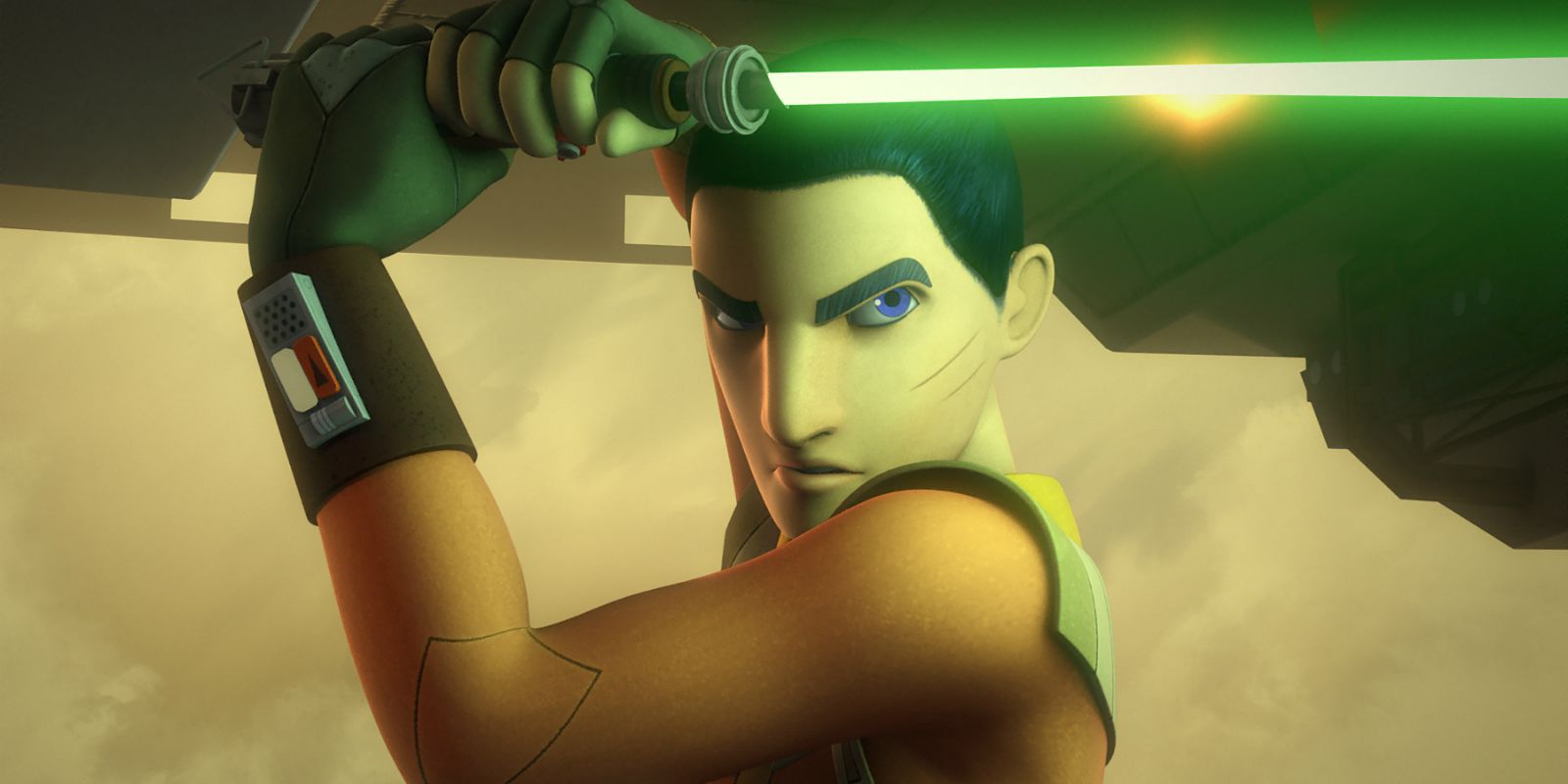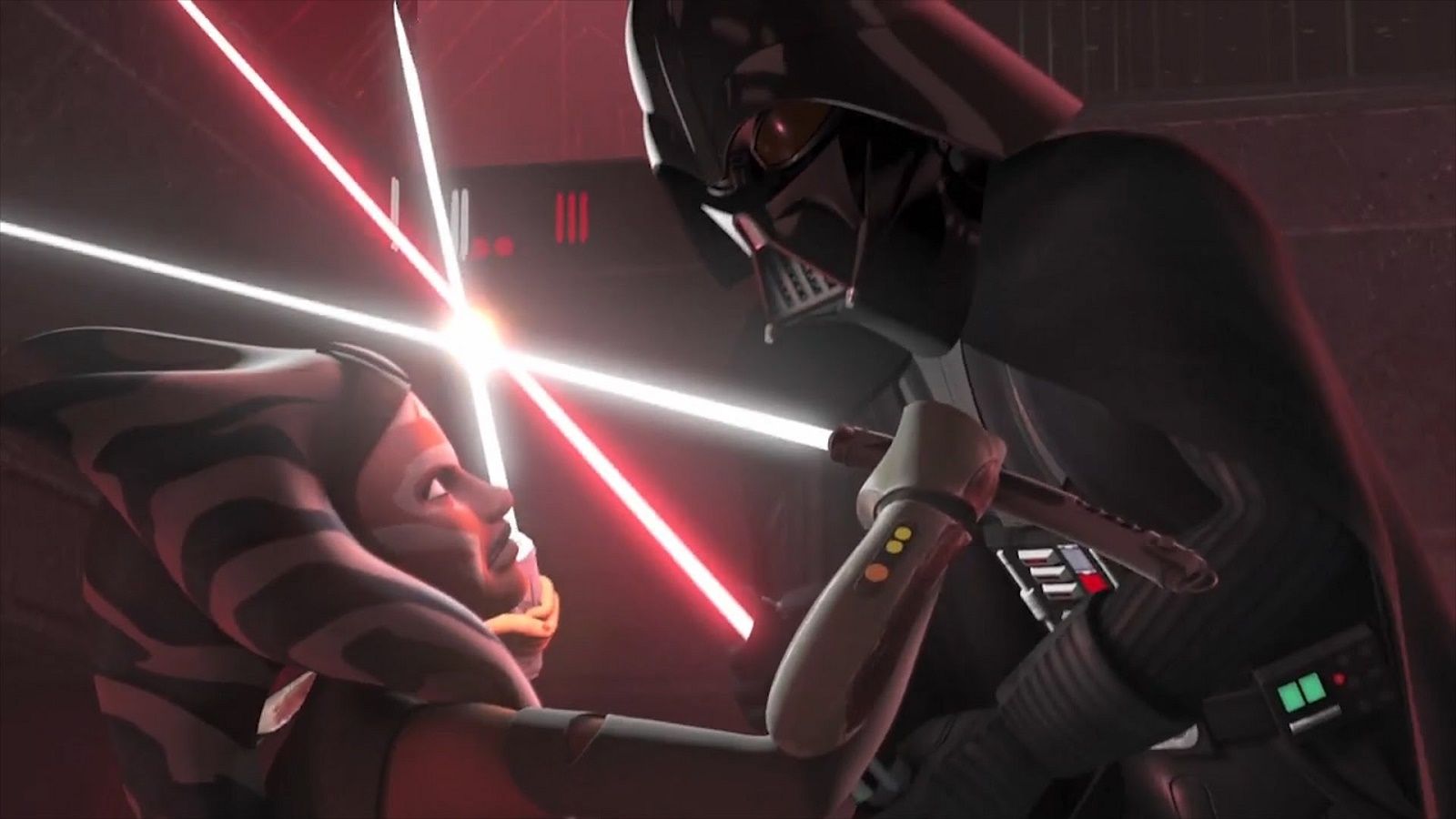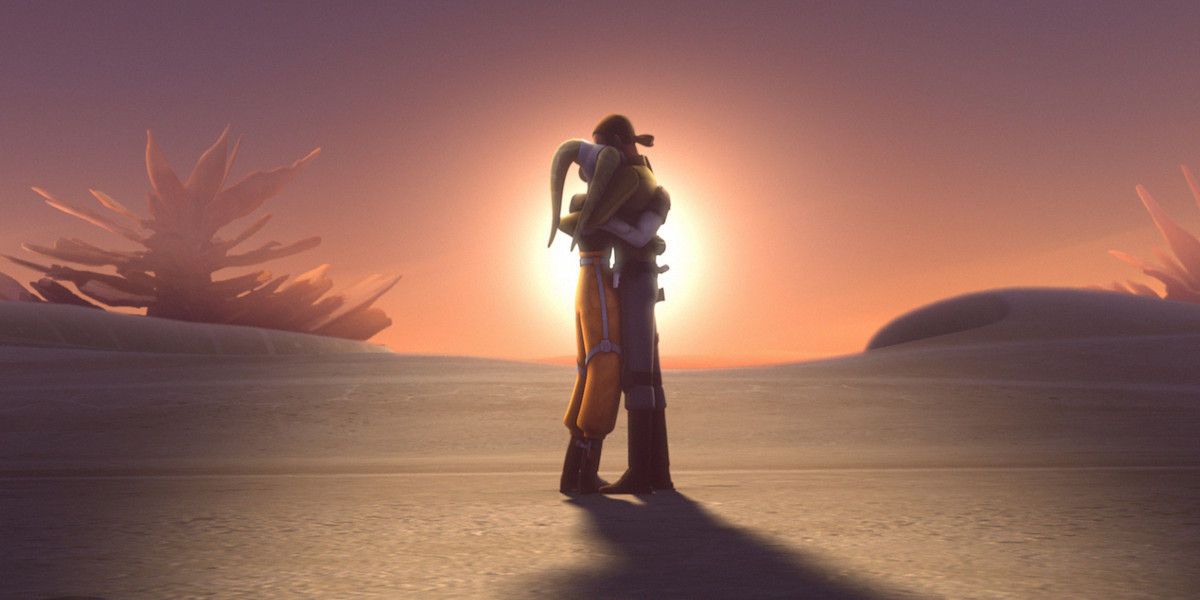As the press for Star Wars: The Last Jedi begins in earnest, the detractors have also come back out in force as well. Once more, the comment sections and Reddit forums are awash in debates about whether the sequels are actually good or just nostalgia vehicles. As part of this debate, a sort of revisionist Star Wars history has started: more and more fans are leaping to defend the prequels. Once the most hated films the galaxy, the prequel trilogy has become cool in a way. Similarly, Star Wars: The Clone Wars has experienced a boom in popularity due to the way it enhances the prequel trilogy.
And then there is Star Wars Rebels, Lucasfilms' second major animated series. The show forgoes familiar protagonists such as Obi-Wan Kenobi or Anakin Skywalker (though both do appear in the show) in favor of a band of original characters. Initially, it had a familiar Disney premise - a spunky orphan named Ezra joins a ragtag group of rebels and learns the ways of the Force from Jedi-in-hiding Kanan. However, the show has moved far beyond the simple pilot to explore the larger origins of the rebellion itself. At the close of season three, the characters are almost unrecognizable from where they began, and despite airing on Disney XD the show's willingness to tackle darker themes make it more of a companion to Rogue One: A Star Wars Story than anything else, even though the body count is still relatively low.
From epic finales such as 'Twilight of the Apprentice' and 'Zero Hour' to remarkable character-centric stories like 'Trials of the Darksaber' and 'The Honorable Ones,' Rebels has proven time and time again that it more than lives up to the legacy of the many Star Wars films, shows, and books that have come before. Between the oftentimes graceful and mature narrative and the excellent character development, Rebels has emerged ahead of the pack as the best Star Wars prequel.
This will no doubt be a controversial statement to those embroiled in the prequel debates. Despite drawing large, enthusiastic crowds at Star Wars Celebration and inspiring its own devoted base in the fandom, some fans still criticize the show for being too childish. Common complaints center on the villains, Ezra's personality, and a lack of true emotional stakes. But what many seem to forget is that for all the show's thematic maturity, it is still a cartoon for all ages. This is Star Wars, after all. Of course good will triumph over evil and the heroes will snatch victory from the jaws of defeat. Even so, Rebels shouldn't have to pull a Game of Thrones and wipe out a majority of the main cast simply to garner a reaction. Season four might see the death of major characters - after all, Kanan and Ezra can't be part of the rebellion when Luke shows up - but showrunner Dave Filoni has demonstrated (as he did in Clone Wars before it) that character arcs might not always end where we expect.
The balancing act between family-friendly entertainment and the more adult elements is also executed with a far more deftly than prequels or even in The Clone Wars in some cases. The prequels are often criticized for the way they blend juvenile slapstick like Jar Jar making "poodoo" jokes, children being murdered, domestic abuse, and complex political allegory all into the same narrative. The Clone Wars has a far better reputation, but it occasionally veered into territory too dark or violent for kids, losing track of its target audience. Some of the most famous moments in Star Wars are its darker moments, but at its heart, it has always been a space fairy tale, a hopeful story where good does triumph despite all odds. This is where Rebels truly excels. It never becomes unwatchable or too dark for children, even though parents were cautioned about the episode 'Twilight of the Apprentice,' but it also never shies away from the realities of rebellion.
Next Page: [valnet-url-page page=2 paginated=0 text='It%20Has%20the%20Best%20Characters']
Ezra might not be Star Wars' most popular protagonist, but he certainly has a better reception than nine-year-old Anakin Skywalker, who managed to blow up a space station his first time flying solo. He's progresison as a Jedi and struggles with the dark side are also more cohesive than older Anakin, who's Jedi training happened mostly off-screen, with the movies jumping several years at a time. And even if Ezra isn't your favorite character on the show, there's a strong ensemble of Rebels, Imperials, and otherwise to choose from, all of whom more than carry their narrative weight. Breakouts include Mandalorian explosives expert Sabine and rebel leader Hera, who both go a long way towards making up for Star Wars' historical lack of female representation. They, along with Kanan, are given rich arcs and development; the third season in particular is a triumph of storytelling for all three.
One of the biggest problems with prequels, not just for Star Wars, but for all prequels, is that they're designed around bringing the characters to a specific ending we already knew. The Clone Wars' is often praised for its character development, and while it did wonders for Anakin, Padme, Obi-Wan, and a swathe of smaller characters, it was always hindered by the fact they were building to a fixed point, so they might gain nuance, but they'd never grow beyond what we'd already seen them become. In Rebels, the heroes and villains can develop more naturally because we don't have the rest of their story yet. Many of the show's best episodes are the character-focused ones where we really get into their individual psyches. Even the least-developed protagonist, Lasat warrior Zeb, got one of the series's strongest episodes to showcase his growth as a character. Sabine's arc in season three was perhaps the best-received arc of the season, and when Rogue One revealed Hera had become a general, the internet lit up with joy.
The show's villains are also given equally rich treatment. The rogues gallery for Rebels has always been fascinating, from the mysterious Inquisitors to agent-turned-rebel Kallus, but the real winner from the show is infamous villain Thrawn. The darling of Expanded Universe fans since Timothy Zahn's Heir to the Empire was first published, the reveal that he was going to be the primary antagonist for season three during the 2016 Star Wars Celebration was probably the highlight of the event. Thrawn burst into Rebels, complete with a tie-in novel written by Zahn, and instantly surpassed expectations. Even though the main protagonists escaped with their lives from his attack in the third season finale, it was only thanks to supernatural intervention. Thrawn is a new kind of villain because it's unlikely that the Rebels themselves will not be able to defeat him - after all, they aren't supposed to have any major victories before Rogue One. It might take an Imperial higher-up, or maybe his bodyguard Rukh who will be introduced in season four, the latter being the way he dies in the EU. Or, Thrawn could even live to fight another day. After all, he appears to have some sort of connection to The First Order.
Next Page: [valnet-url-page page=3 paginated=0 text='It%27s%20the%20Most%20Original']
Unlike the prequels, Rebels has the freedom to focus on previously unknown characters, choosing to only use legacy characters and callbacks when needed. It would've been easy for the writers to make the show the Ahsoka Tano show, the Vader show, or the Thrawn show, or to have too many forced cameos. Instead, the writers smartly chose to focus on their original characters, only utilizing legacy characters when the situation calls for it. For example, appearances by Bail Organa, Saw Gerrera, and Mon Mothma make sense; they were founders of the rebellion. The Leia episode also works, as Leia was part of the beginnings of the rebellion as well (and it also has great ties to A New Hope). There is no risk of legacy characters overshadowing Ezra and his friends, which means the show actually works as a standalone prequel. You don't need to have seen the originals or the prequels for it to make sense.
Perhaps Rebels's greatest strength is it's heart. Out of all the Star Wars prequels, its tone is the most aligned with A New Hope and The Empire Strikes Back in that it showcases fairy tale-esque virtues - kindness, love, family, and hope - triumphing over a seemingly unbeatable evil. As Hera's voiceover in the season four trailer says, "it was a simple story." The show is simple, but unlike the sprawling arcs of The Clone Wars and the hit-or-miss elements of the prequels, it tells a cohesive story about a misfit family and the rise of the rebellion, and its tonal seguay into the original trilogy provides the perfect bridge between it and the other, much more controversial, prequels.
Obviously, there are plenty of Star Wars fans that love both the prequels and The Clone Wars, and they should! But when it comes to telling a story that actually sets the stage for the Rebellion we see in the original trilogy and matching the tone and themes of the movies its building to, Rebels is the prequel you're looking for. It's also the prequel that actually works as a standalone story, giving the audience enough information without becoming overly reliant on the nostalgia value of the originals. With a highly anticipated final season on the horizon, Rebels will most likely go down in history as one of the finest pieces of Star Wars media, and the best prequel to come out of Lucasfilm, a heartfelt and hopeful journey that embodies all the best of Star Wars.

